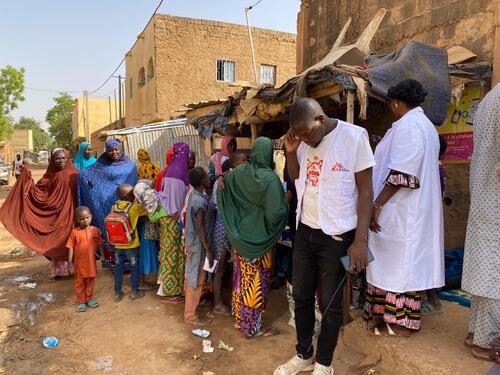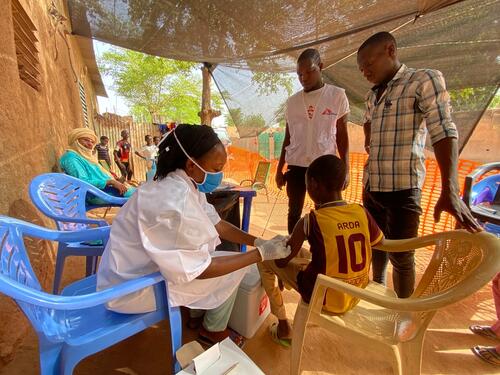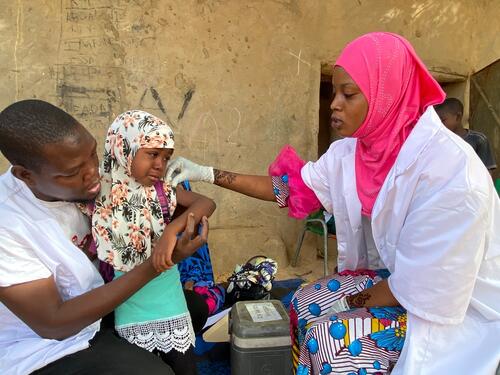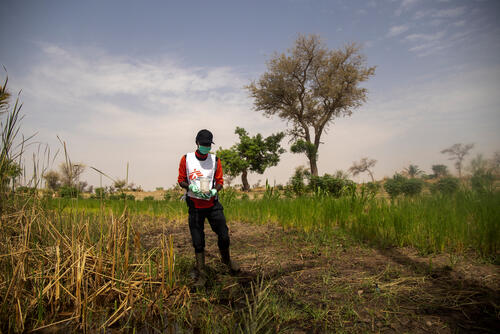Measles epidemics are an annual occurrence in Niger, but this year’s epidemic is skyrocketing – the result of insecurity and the knock-on effects of COVID-19, says MSF medical coordinator François Rubona, whose teams are three months into a mass vaccination campaign to protect more than 700,000 children against the world’s most contagious viral disease. Rubona outlines the situation in this interview.
What is the current measles situation in Niger?
This year, we have seen the number of people affected by measles increase exponentially compared to last year. In the first quarter of 2021, the country recorded 3,213 cases of measles, compared to 1,081 in the same period last year, according to data from the Nigerien Ministry of Public Health’s Notifiable Diseases Register, meaning that cases have almost tripled. By April, Niger had had more than 6,000 suspected cases of measles, including 15 deaths and the measles epidemic had been declared in 27 of 73 health districts. Most affected are the regions of Agadez, Dosso and Tahoua.
Measles is the world’s most contagious viral disease and one of the main causes of death in young children. The most effective way of tackling measles is to ensure 95 per cent vaccination coverage, according to guidance from the World Health Organization (WHO).
However, in Niger, data from health centres in some of the affected districts suggests vaccination coverage is 50 per cent at best. In areas such as Diffa, Tillabéry and Tahoua, the low coverage can be explained by a worsening security context which has led to people being displaced from their homes, making it more difficult to access basic healthcare. This year’s measles epidemic has also been impacted by the COVID-19 pandemic, which has created new constraints for routine and catch-up vaccination campaigns.

What challenges has the COVID-19 pandemic imposed on your work?
When the first COVID-19 cases were declared in Niger in March 2020, fears surrounding this unknown disease probably led to a decrease in visits to health centres. As a result, fewer mothers brought their children in for routine vaccinations.
The pandemic has also affected health workers, as some staff have tested positive or been identified as contacts and have had to self-isolate or quarantine. This has meant clinics no longer running at full capacity and being forced to reduce some activities, especially preventative care.
At the same time, over the past year the government and its partners, including MSF, have had to focus on tackling the pandemic, further impacting preventative care.
At times, border closures and restrictions have made it more difficult to import medical supplies. However, this year we have managed to order and ship 700,000 doses of measles vaccine into the country in order to respond to the epidemic and create an emergency preparedness stock.
Over recent weeks, we have seen a low participation rate in some of the neighbourhoods where we ran vaccination campaigns, due to confusion between measles and COVID-19 vaccinations. In Tillabéry, for example, some communities have completely refused to be vaccinated. In Niamey, too, our teams have met with some vaccine hesitancy, linked to rumours that measles and COVID-19 vaccines were being given simultaneously.

In the first few days of our vaccination campaign in Tillabéry in April, our teams recorded a coverage rate of just 4-5 per cent of their daily target. As a result, we have reinforced our community engagement and outreach activities in order to remind families of how measles can impact children’s health and how vaccinating children can help protect them and stop the disease from spreading.
What is the outlook for the upcoming months?
The current measles situation in Niger is worrying, especially as it highlights the consequences of a decrease in vaccine coverage and routine vaccination activities. We now fear a rise in epidemic risk for all the diseases that can usually be avoided through vaccination. For example, we have seen patients with symptoms of meningitis in Niamey and more than 1,100 meningitis cases have already been notified countrywide. If routine and catch-up vaccinations fail to happen regularly, the effects of this decrease in coverage will probably be felt for years to come.
At the same time, as the seasonal peaks for malaria and malnutrition draw closer, we are monitoring the situation closely. Last year’s malaria peak was particularly damaging, as it was both higher and lasted longer than usual – it didn’t end until January 2021. Taken alongside highly worrying forecasts regarding food security and malnutrition, we have to be extremely vigilant, including in regions as such as Maradi and Zinder, which are often neglected by donors due to being further from the epicentre of armed conflict and its consequences.
MSF has been working with the Ministry of Health for 36 years to support the response to epidemics in Niger. Since the start of 2021, MSF teams have provided support to health authorities in tackling measles in the regions of Dosso, Tahaou, Agadez, Tillabéry, Diffa and Niamey. This includes strengthening the epidemic surveillance system, transporting samples to the National Medical Laboratory, donating medical supplies and training health workers in caring for people with the disease. In the Zinder region, MSF teams also vaccinated more than 222,000 children against meningitis.






